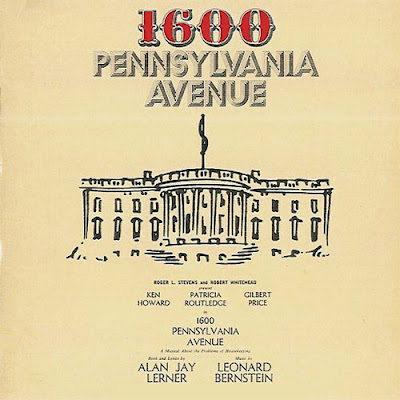As promised, I spent some time in the campus library at SUNY New Paltz investigating their periodicals that consist of theatre reviews from the major news sources, mostly in the newspaper, but also some from transcriptions from television newscasts. (Which unfortunately meant that there was nothing about out of town shows in these volumes, so there was no Prettybelle for me to bring back for our beloved Sarah).
Here is the round-up on Patricia Routledge in 1600 Pennsylvania Avenue and Darling of the Day:
1600 Pennsylvania Avenue – 1976
“…and Patricia Routledge was often deliciously funny (although in an accent usually doggedly and oddly British) as all the First Ladies.”
– Clive Barnes, NY Times
“On the evidence of 1600 Pennsylvania Avenue, last night’s musical at the Hellinger, both the show and history would have been more fun if our Presidents had been women.
Certainly the liveliest sally of the evening, which whisks us through a hundred-year tour of the White House, is provided by Patricia Routledge who, as Rutherford B. Hayes is taking the oath of office, plays both a fluttery Lucy Hayes and a caustic Julia Grant in a Leonard Bernstein-Alan Jay Lerner number called ‘Duet for One.’
That’s fun.”
– Douglass Watt, NY Daily News
“But Lerner’s book was potted historyballs and his lyrics swing dizzyingly between very bad and very good, the best being a one-person duet in which Patricia Routledge played both the outgoing First Lady, boozy Mrs. U.S. Grant, and the incoming one, flibberty Mrs. Rutherford B. Hayes. Ms. Routledge would have stopped the show, if there had been one to stop.”
– Jack Kroll, Newsweek
“The second and best of the two acts contains a glorious piece of vocal and histrionic foolery by Patricia Routledge. It occurs in a number called ‘Duet for One.’ With a toss of her head and an instant transformation of manners, Miss Routledge alternates between a feisty Julia Grant and a mincing Lucy Hayes. The resultant hilarity is worthy of Bea Lillie. You can’t do better than that.”
– John Beaufort, Christian Science Monitor
“And only once did a song hint at any real sass: The estimable Patricia Routledge, playing all of the Presidents’ wives to Ken Howard’s recurring husbands, was relieved of her whining matronly duties just long enough to engage herself in a one-woman duet in which a very blunt Julia Grant made mincemeat of a successor so refined that her very fingers were made of ‘delicate bamboo.'”
 – Walter Kerr, Sunday NY Times, Stage View: “Moralizing is a Bore; But Good Music Helps”
– Walter Kerr, Sunday NY Times, Stage View: “Moralizing is a Bore; But Good Music Helps”
Darling of the Day – 1968
“And then the widow, depressed on learning that she has wed a great artist instead of a lowly valet, repairs to the pub, gets tipsy all alone, and begins an ebullient song, ‘Not on Your Nellie,’ which is a real showstopper. This is Patricia Routledge in her prime.”
– John Chapman, NY Daily News
“Miss Routledge, who really can sing, has more to work with as the young widow slightly past her prime, and it is a joy to watch her. With those rosy cheeks and that comfortable bosom, she makes you think inevitably of buttered toast, crisp linen and good smells from the kitchen. Every artist’s dream wife-mother, in short: all common sense and unselfish solicitude.
But a lively wench with a couple of beers in her. The high point of Darling of the Day is a thumping good production number in the local pub (‘Not on Your Nellie’), in which Miss Routledge, somewhat sozzled, kicks up her heels with a bunch of boys. It would stop a livelier show; it starts this one, for a moment.”
– Dan Sullivan, NY Times
“Darling of the Day is a superior musical comedy, and Miss Routledge is a treasure.”
– Richard Watts, Jr., NY Post
“No such problems with Patricia Routledge, who played the wife as if an apple on a string, rosy bouncing and delicious. Miss Routledge had all the musicality the show hadn’t, not merely because of a strong singing voice (which could be legitimate when she chose) but because of her consuming sense of music and performing. She may have been the commoner but she had all the class.”
– Martin Gottfried, Women’s Wear Daily
“The chief attraction of the evening is the English actress Patricia Routledge, who secures her man through a matrimonial agency. Miss Routledge, equipped with a genuine English accent of the class and area she is supposed to represent (although Professor Henry Higgins might argue about it), is a joy all the way through. She is brisk, fresh and appealing, a comfortable yet lively youngish woman who can kick up her heels with a beer or two in the pub when the occasion arises. She projects a sort of jaunty domesticity in her pretty little Putney cottage.”
– Richard P. Cooke, The Wall Street Journal
(and my personal favorite:)
“And when she hiccups her way into a showstopper called “Not on Your Nellie” – this is a real showstopper, not a clamoring bargain-basement job that has figured out all the pressure points – she hiccups like a woodwind stealing into the pit at dawn. Becoming a coloratura in her cups, she lets you know the cups are mint Sevres. It’s all needlepoint, and nifty, and I warn you: If you don’t catch her act now, you’ll someday want to kill yourself. I’ll help you.”
– Walter Kerr, Sunday NY Times, Stage View: “Patricia is My Darling”

